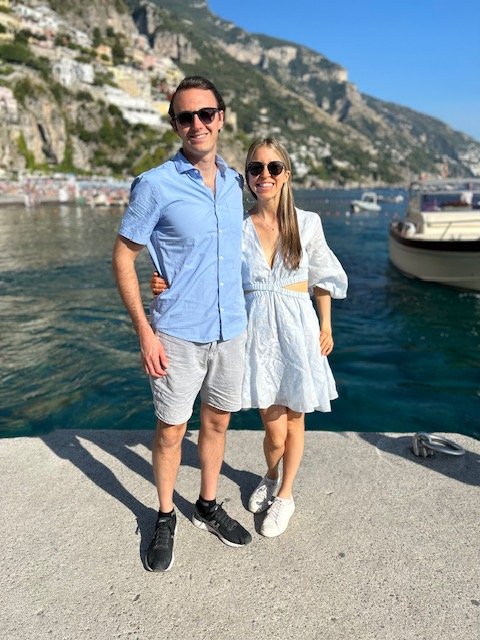Permission Slip
Hi friend,
Last week, I was forced to put my Recovering Type A+ Perfectionist tactics to the test as I struggled to practice what I preach.
I was traveling to Italy for my sister’s wedding, and the wedding week just so happened to be bookended by two very intense periods at work. (Funny how those “calm” wind-down and ramp-up periods before and after time off never actually pan out, right?)
In the time leading up to the trip, I promised myself that once I left for the airport I was going to take a serious break from all things work-related — both because (1) this was the first real vacation I’ve taken in quite a while and I knew that I 100% deserved to fully enjoy it, and (2) because I was well aware (based on countless past occasions on which I’ve learned … and painfully relearned … my lesson) that if I didn’t give my brain the break it desperately needed, there was absolutely no way I was going to be able to hit the ground running upon my return.
And yet, notwithstanding having spent a significant amount of time literally fantasizing about how amazing it was going to be to finally “turn it off,” when the time came to actually disengage I found it surprisingly (or perhaps not so surprisingly?) challenging to do so.
Indeed, the pangs of anxiety/guilt/doubt that I experienced when I considered trading out my phone and laptop for my book (e.g., “But the mountain of work I’ll face on my return!”; “But I’ll fade into LinkedIn oblivion!”; “Does relaxing even really work, anyway!?”) were so intense that I’m certain I would’ve thrown in the towel had I not preemptively deployed one of my favorite strategies for positioning myself to persevere in such situations:
Writing myself an emphatic (mental) permission slip to take this time off.
Writing permission slips to engage in self-care (whether it’s by not working on vacation, putting my phone away at a certain point in the evening, carving out ten minutes to catch my breath in the morning, or squeezing a much-needed walk into my workday) has proved to be a super effective hack for enabling me and my Recovering Type A+ Perfectionist clients and students to follow through on our intentions to engage in those counterintuitive (and typically quite out of character) practices that have been scientifically-shown to be essential for optimal functioning, as well as health and happiness.
Why does this strategy work?
Self-care permission slips work because they essentially provide us with the metaphorical surfboard we need to engage in “urge surfing” — i.e., to withstand the vehement and often down-right panicked protestations of our anxious minds long enough to enjoy the benefits that reside on the other side.
Urge surfing is a mental technique for managing cravings or unwanted behaviors — in this case compulsive working (i.e., working even when your rational brain has determined it’s no longer desirable to do so). Rather than giving in to the urge, you learn to ride it out until it subsides, allowing you to (1) experience the positive effects of abstaining from the habit or engaging in a more constructive alternative behavior, and (2) recognize that the momentary discomfort of resisting the urge pales in comparison to the overarching discomfort that ensues when you continuously yield to it.
But the problem is that, just like regular surfing (which I’ll admit, I’ve never actually tried, though I still haven’t gotten over my obsession with Kate Bosworth in Blue Crush), urge surfing is HARD — sometimes so hard it feels downright intolerable.
But it IS tolerable, and the beautiful thing is that each time you DO tolerate it — each time you surf an anxious urge rather than yielding to it — you fortify both your feelings of self-confidence and self-efficacy and your ability to successfully surf additional urges in the future.
And like a good surfboard, self-care permission slips provide us with the scaffolding and support we need to successfully ride those waves of anxiety.
Why are self-care permission slips so helpful?
Because they directly appeal to the three things that our perfectionist brains love most: STRUCTURE, CONTROL, and PRODUCTIVITY.
By writing yourself a specific self-care permission slip in advance (e.g., “I hereby give myself permission to not check my phone after 9 pm on weeknights.”; OR “I hereby give myself permission to not do any work or respond to emails this Saturday.”), you are providing your brain with the structure and sense of control it needs to allay its concerns that any deviation from your usual hustle will send you sliding down a slippery slope of unfettered self-care toward slothfulness, greed, and gluttony.
This is because your permission slip serves as a critical reminder and source of proof that when you follow through on your self-care-related intention (e.g., when you take that break or put your phone away), it is NOT an act of weakness or a failure to work but rather a display of control through which you are succeeding in honoring a commitment that you intentionally made to yourself — with very good reason — in advance.
Speaking of very good reason, you can appeal to your perfectionist brain’s obsession with productivity by reminding it of the wealth of scientific studies unequivocally demonstrating that rest and restoration are critical for peak performance; that feelings of joy, meaning, and connection turbocharge energy and engagement; and that by perpetually cutting yourself off from these experiences, you are not only not doing yourself a favor, but actually impeding your ability to perform at your highest capacity (in addition to limiting your happiness and, in all likelihood, your lifespan).
(You can think of this as the “Educational Benefits” portion of your permission slip, except rather than, “This trip to the zoo will help students understand the importance of taking care of the environment and develop compassion and empathy for animals.”, it’s more like, “This phone-free hour in the evening will enable you to decompress, meaningfully connect with your partner, prevent blue light from messing up your circadian rhythm, and help you get a good night’s sleep, thereby making you more productive the next day and strengthening your relationship in a way that will promote resilience in all areas of your life.” )
While this strategy does not magically eliminate all feelings of anxiety, guilt, and doubt (I would be lying if I said I’ve discovered anything that can), it has time and time again enabled me to tolerate those uncomfortable feelings long enough for them to wane enough for me to be able to enjoy the benefits of the rest, restoration, joy, adventure, and connection that lay on the other side.
So today, friend, I encourage you to ask yourself:
What is one step you’ve been wanting to take to cultivate your well-being but struggling to follow through with?
Once you’ve identified it, I encourage you to write yourself an emphatic permission slip authorizing yourself to take that step, and to refer back to it when your perfectionist brain inevitably protests.
Because while we can’t necessarily stop all waves of anxiety from coming, we CAN deploy strategies that will empower us to ride them safely and steadily to shore.
And I have to tell you, the beach is lovely :)
As always, don’t hesitate to reach out if there’s any way I can support you in this effort. In the meanwhile, know that I am rooting for you!
With love,
Jordana




